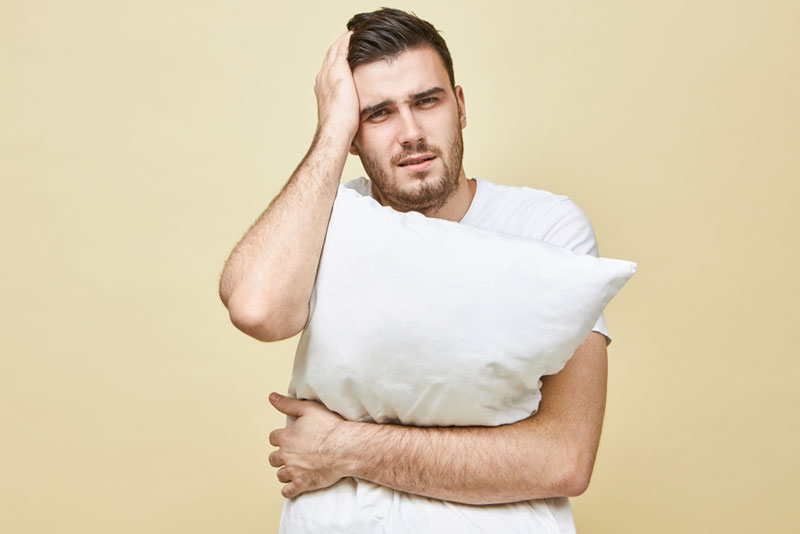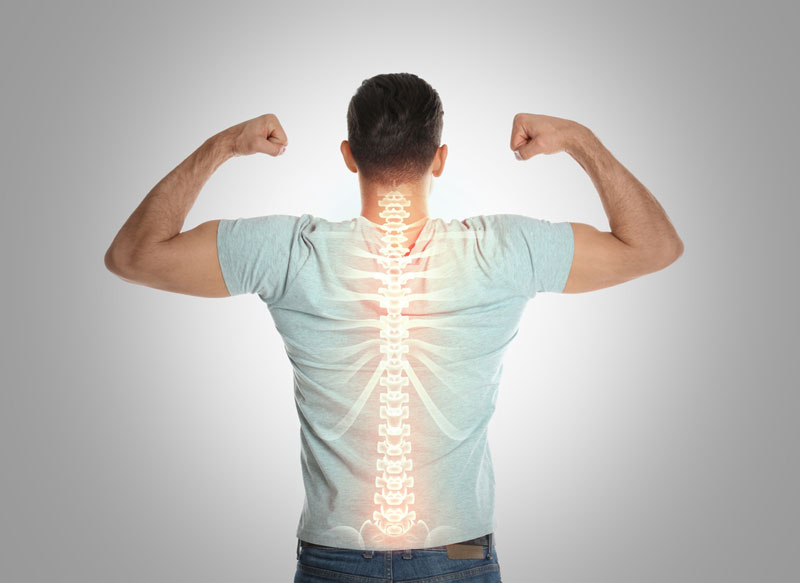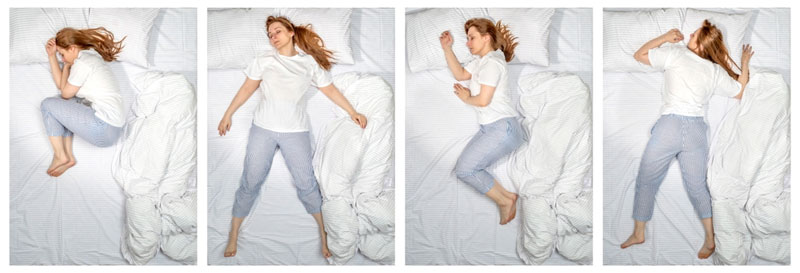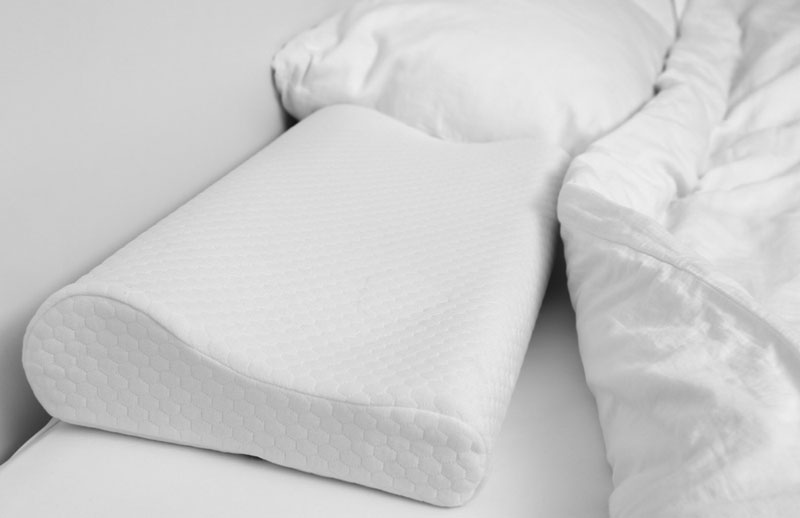The foundation of optimal health lies in good sleep, often described as the gateway to a world of wellness. But have you ever considered exploring this realm without the company of your trusty pillow? As surprising as it may seem, sleeping without a pillow could be one of the hidden health hacks some people are unaware of. This post will dive into the science behind this practice, examining its potential benefits and effects on posture and health. So buckle up and prepare for an eye-opening journey that questions societal norms and invites possibilities of sleeping au naturel. It could be the key to revamping your sleep quality and elevating your overall health status.
Sleeping without a pillow can have both benefits and drawbacks. While it may offer advantages such as reduced neck pain for stomach sleepers and better spinal alignment for back sleepers, it could also lead to discomfort and improper head and spine alignment for side and back sleepers. Ultimately, choosing a pillow depends on personal comfort and preference.
The Benefits and Consequences of Sleeping Without a Pillow

The right pillow can make a world of difference in sleep. But have you ever wondered what would happen if you ditched the pillow altogether? Let’s explore the benefits and consequences of sleeping without a pillow.
Benefits:
- Improved Spinal Alignment: Sleeping without a pillow is beneficial for maintaining proper spinal alignment. When we lie flat on our backs without a bulky pillow, our spine rests naturally. This can reduce strain on the neck and back, potentially alleviating discomfort and preventing long-term posture problems.
- Reduced Neck Pain: For stomach sleepers, sleeping without a pillow can be beneficial as it helps maintain a neutral head position. Placing a thin pillow under the hips can further promote spinal alignment, reducing strain on the neck.
- Decreased Allergies: Pillows can harbor dust mites, leading to allergies for sensitive people. Eliminating the pillow reduces exposure to allergens and creates a cleaner sleep environment.
- Fewer Sleep Wrinkles: The constant pressure from a pillow against your face can cause creases, leading to sleep wrinkles over time. Sleeping without a pillow may minimize these fine lines and prevent premature ageing.
- Reduced Acne and Frizzy Hair: Pillowcases can accumulate sweat, dirt, and oils, then transfer onto your skin or hair while you sleep. Going pillowless can decrease the likelihood of acne breakouts and lessen frizz by eliminating contact with potentially dirty surfaces.
Consequences:
- Discomfort for Side and Back Sleepers: Sleeping without a pillow may not suit everyone. Side sleepers often find comfort in using pillows to support their head and align their neck with the spine. Similarly, back sleepers may experience discomfort without proper head and neck support.
- Improper Head and Spine Alignment: Without a pillow, side sleepers may find their head dropping down, causing misalignment with the spine. This can result in discomfort and potential long-term issues. Body pillows or softer mattresses offer more structural support and comfort.
- Potential Increase in Snoring: Pillows can help keep airways open by elevating the head or supporting side sleeping positions, reducing snoring. Sleeping without a pillow could increase snoring episodes for those prone to it.
- Lack of Standardized Research: It’s important to note that research on the benefits and drawbacks of sleeping without a pillow is limited. Current studies may need to include standardized methodologies or objective data, making it challenging to draw definitive conclusions.
While some individuals have reported positive experiences with ditching the pillow, others may find discomfort or worsened symptoms. Everyone’s body is different, so listening to your needs and consulting a healthcare professional with concerns is vital.
Correct Spine Alignment and Posture

We all know how essential proper posture is for overall health, but did you know that your sleep position can also impact your spinal alignment? Sleeping without a pillow can help achieve correct spine alignment during moments of rest, promoting better posture in the long run.
Natural Alignment Benefits
When lying on your back without a thick pillow, your head, neck, and spine can align naturally. This alignment helps distribute weight evenly along the vertebrae, reducing strain on the neck and upper back muscles. Proper alignment also allows for optimal blood flow, preventing numbness or tingling sensations in extremities caused by poor circulation.
Adjustments for Side Sleepers
Sleeping on your side without a pillow may cause the head to tilt downward, disrupting alignment with the spine. This can lead to discomfort and potential long-term issues. However, using a body pillow or placing a small pillow between your knees can provide extra support and help maintain proper spine alignment in side sleeping positions.
Considerations for Stomach Sleepers

For those who prefer sleeping on their stomachs, the absence of a pillow can make the position more comfortable and improve posture. Placing a thin pillow under the hips can promote proper spinal alignment by reducing lower back strain.
Think of your spine as the foundation of a well-built structure. Just as a strong foundation supports the entire building, correct spine alignment during sleep sets the stage for good posture throughout the day.
By prioritizing correct spine alignment and posture while you sleep, you may notice improvements such as reduced back pain, increased energy levels, and enhanced physical performance during waking hours.
- According to the Journal of Pain Research, around 70% of people with chronic neck pain reported significant improvements after altering their sleeping postures, including removing or changing their pillow type.
- A survey published by Ergonomics found that sleeping without a pillow improved the spinal alignment and reduced back discomfort of about 31% of participants.
- The American Academy of Dermatology states that up to 60% of acne cases are aggravated by sweat, dirt, and oil buildup from pillows, suggesting that not using a pillow can reduce these skin issues.
- Proper spine alignment during sleep is crucial for maintaining good posture and overall health. Sleeping without a pillow can help achieve this alignment, particularly when lying on your back or stomach. Without a thick pillow, the head, neck, and spine can align naturally, distributing weight evenly along the vertebrae and reducing muscle strain. Side sleepers can benefit from using a body pillow or placing a small pillow between their knees to maintain proper alignment. By prioritizing correct spine alignment while you sleep, you may experience reduced back pain, increased energy levels, and improved physical performance during the day.
Skin and Hair Health Considerations

The benefits of sleeping without a pillow extend beyond physical comfort and posture. Let’s examine how sleeping without a pillow can impact skin and hair health.
Impact on Acne and Hair Health
Not using a pillow may also reduce acne, as sweat, dirt, and oil can build up on the pillowcase and transfer onto the skin. Consider this for those struggling with curly hair: Sleeping without a pillow can help tame those unruly strands. The friction between your hair and the pillowcase can cause damage, knots, and increased frizz. By sleeping directly on a smooth surface or using a silk or satin pillowcase, you can wake up to softer, more manageable hair.
It’s important to note that these benefits may vary depending on individual factors such as skin type and hair texture. While some people may see significant improvements in their skin and hair health after eliminating their pillows, others might not experience noticeable changes. Experimenting with different sleep positions and incorporating other skincare and haircare practices alongside sleeping without a pillow may yield better results for some individuals.
Sleeping without a pillow goes beyond physical comfort; it can positively affect your skin and hair health. However, remember that everyone’s skin and hair are unique, so listening to what works best for you is essential.
Considerations for Different Sleeping Positions
Your sleep position can greatly impact your comfort and spinal alignment when forgoing a pillow. Here are some key considerations for different sleeping positions:
- Stomach sleepers: Sleeping without a pillow may make this position more comfortable and improve posture. Lying directly on the mattress without a pillow under your head it helps promote proper spinal alignment. Placing a thin pillow or rolled-up towel under your hips can provide additional support and enhance spinal alignment.
- Back sleepers: Sleeping on your back without a thick pillow can help keep the spine aligned, reducing strain and potential discomfort. Instead of a bulky pillow, consider using a thinner pillow or special pillows designed specifically for back sleepers. These pillows often have contoured designs that provide neck support while maintaining proper alignment with the spine.
- Side sleepers: This position may pose challenges when choosing to sleep without a pillow because most side sleepers prefer to fall asleep in this position. Rolling over during sleep without proper support can lead to neck pain and discomfort. To counter this, using a body pillow or opting for a softer mattress can offer additional support and alleviate strain on the neck and shoulders.
It’s crucial to balance comfort and maintain proper spinal alignment regardless of your preferred sleeping position. Experimenting with different sleeping positions and adjusting pillow alternatives can help you find what works best.
Impact on Stomach, Back, and Side Sleepers

Whether you’re a stomach, back, or side sleeper, sleeping without a pillow can affect your comfort and overall posture. Let’s explore how for each sleeping position:
Stomach Sleepers:
Sleeping without a pillow is beneficial for those who prefer snoozing on their stomachs. By eliminating the pillow, you reduce the strain on your neck and allow for better spine alignment. Placing a thin pillow under your hips can further promote spinal alignment and alleviate discomfort during sleep. However, it’s important to note that not all individuals find this position comfortable without cushioning. Experimenting with different levels of support or using a thinner pillow may be more suitable.
Back Sleepers:
Sleeping on your back without a thick pillow can help keep your spine aligned and reduce strain on your neck and shoulders. Maintaining proper alignment between your head, neck, and spine is key. Consider using a thinner pillow or special pillows designed specifically for back sleepers that provide adequate support in maintaining this alignment. It might take some time to adjust to this change, but it can lead to improved posture over time.
Side Sleepers:
For side sleepers, sleeping without a pillow may present some challenges. This sleeping position often requires additional support to maintain proper spinal alignment. Without a pillow, the head may drop down or tilt sideways during sleep, disrupting the alignment between the head and spine. This misalignment can lead to discomfort and potential pain in the neck and shoulders. Imagine waking up after a night of side-sleeping without a pillow only to find yourself experiencing neck stiffness and soreness throughout the day.
While it may seem counterintuitive, alternatives like body pillows or softer mattresses can support side sleepers who want to forego traditional pillows. These alternatives offer the ideal blend of comfort and support, ensuring proper alignment throughout the night.
Exploring Alternatives to Traditional Pillows
While sleeping without a pillow might not be the perfect solution for everyone, alternative options that cater to various sleep preferences and needs are available. These alternatives can provide similar benefits in terms of improved posture and reduced discomfort during sleep:
- Orthopedic Pillows: Designed specifically to support proper spinal alignment and relieve pressure points, orthopedic pillows come in various shapes and materials. They offer targeted support for specific areas, such as the neck and shoulders.
- Curved Contour Pillows: These are ergonomically shaped to comfortably cradle your head, neck, and shoulders while promoting optimal alignment. The curved design helps distribute weight evenly, reducing strain on these areas.
- Body Pillows: Body pillows are elongated pillows that provide full-body support. They can be especially beneficial for side sleepers by helping align the spine properly and simultaneously supporting various body parts.
- Rolled Towels/Microbead Pillows: Rolling up towels or using microbead pillows under the neck or other targeted areas can provide localized support for individuals who prefer a more customized approach.
- Water Pillows: Water-filled pillows allow you to adjust the firmness or height according to your preference. This customizable aspect provides individualized support and comfort.
Finding the right alternative may require trial and error as everyone’s sleep preferences vary. Consulting with a healthcare professional or trying out different options until you find one that suits you best is key.
From Orthopedic Pillows to Supports for Better Comfort

As we strive for a good night’s sleep, our quest for comfort often leads us to explore various options, including orthopedic pillows and other supports. Orthopaedic pillows are designed to provide additional support and maintain proper alignment for different sleeping positions. They come in various shapes and materials, such as memory foam, latex, or water-filled options. These specialized pillows aim to alleviate pressure points, promote spinal alignment, and reduce discomfort during sleep.
Supports for Enhanced Comfort
Additionally, other supports can contribute to better comfort while sleeping. Body pillows are elongated pillows that can be placed between the knees or hugged to support side sleepers or pregnant individuals. Rolled towels strategically placed under the neck or lower back can help maintain proper alignment. Another option is curved contour pillows that cradle the head and neck for improved comfort and alignment.
While these orthopaedic pillows and supports can benefit many people by providing targeted support and ensuring proper spinal alignment, it’s worth noting that they may not suit everyone’s needs. Personal preferences play a significant role in selecting the right pillow or support. Some individuals may find that traditional pillows work just fine, while others may require additional support due to specific conditions or sleep preferences.
Finding what works best for your body and sleeping style is crucial. Experimenting with different pillow types, materials, and supports can help you determine what provides the optimal level of comfort and support for a restful slumber.
Choosing the right pillow or support is akin to finding the perfect pair of shoesthey should fit you snugly while supporting your feet. Similarly, a pillow should cradle your head comfortably while maintaining proper alignment with your spine.
The Controversy: To Sleep or Not to Sleep Without a Pillow
Whether to sleep with or without a pillow has sparked considerable debate among sleep experts and enthusiasts. Advocates for sleeping without a pillow argue that it can benefit posture and health. In contrast, proponents of using pillows emphasize their role in providing support and comfort during sleep.
Pros and Cons of Pillowless Sleep
On one hand, those who sleep without a pillow claim that it can help improve posture by allowing the spine to align naturally. They argue that sleeping without a pillow promotes proper spinal alignment, reducing the risk of neck and back pain. Moreover, some individuals find that sleeping without a pillow relieves tension headaches caused by poor posture.
The Importance of Pillow Use for Some
On the other hand, supporters of using pillows contend that they play an essential role in providing support for the head, neck, and shoulders. Pillows are designed to maintain proper alignment and alleviate pressure points. They argue that using a suitable pillow can help prevent discomfort and reduce the risk of developing musculoskeletal issues over time.
It’s important to note that choosing between using or forgoing a pillow ultimately depends on individual needs and preferences. Factors such as sleeping position, body type, pre-existing conditions, and personal comfort come into play. Consult a healthcare professional or experiment with different pillow options to find the best.
Remember, there is no one-size-fits-all solution for sleeping without a pillow. What matters most is finding a sleep setup that promotes comfort and healthy alignment and makes you wake up refreshed and rejuvenated.
Can sleeping without a pillow help alleviate certain neck or back pain issues?
Sleeping without a pillow can help alleviate certain neck or back pain issues. While pillows can provide comfort, they often contribute to poor posture and misalignment of the spine during sleep. A study by the National Sleep Foundation found that using no pillow or a very thin pillow reduced neck pain and improved spinal alignment. Without a pillow, the spine’s natural curvature is better maintained, reducing strain on the neck and back muscles.
Are there any specific recommendations or guidelines for those considering sleeping without a pillow?
Yes, there are some recommendations for those considering sleeping without a pillow. Firstly, ensure that your mattress provides adequate support for proper spinal alignment. Additionally, gradually transition to pillowless sleep to allow your body to adjust. Studies have shown that sleeping without a pillow can alleviate neck and back pain, improve circulation, and minimize wrinkles caused by pillow-induced pressure on the face. However, it’s crucial to note that individual preferences and needs may vary, so consulting with a healthcare professional is advisable.
What are the best positions for those who prefer sleeping without a pillow?
The best positions for those who prefer to sleep without a pillow are on the back or side. Sleeping on your back allows spinal alignment and reduces the strain on the neck and shoulders. Side sleeping with a neutral spine also promotes healthy posture. Without a pillow, these positions can help alleviate neck pain and reduce the risk of developing wrinkles caused by compressing the face against a pillow. According to a study published in the Journal of Manipulative and Physiological Therapeutics, sleeping without a pillow can improve overall spinal alignment and reduce morning stiffness in individuals with certain musculoskeletal conditions (source: Journal of Manipulative and Physiological Therapeutics, 2011).
What are the potential benefits of sleeping without a pillow?
Sleeping without a pillow can offer several benefits for posture and overall health. Firstly, it allows the neck and spine to remain in a neutral alignment, reducing strain and preventing potential issues like neck pain or stiffness. Sleeping without a pillow may help alleviate snoring by keeping the airways open. A study from the Journal of Chiropractic Medicine found that participants who slept without a pillow experienced improved spinal alignment compared to those who used pillows. However, it’s important to note that individual preferences and conditions may vary, so consulting with a healthcare professional is recommended before making any changes to your sleep routine.
Are there any potential risks or drawbacks to sleeping without a pillow?
While sleeping without a pillow has potential benefits, such as improved spinal alignment and reduced neck pain, there can also be potential risks and drawbacks. Without a pillow, some individuals may experience discomfort or strain on their neck and shoulders, resulting in disrupted sleep. Furthermore, studies have shown that using a proper pillow can help alleviate snoring and improve blood flow during sleep. It is essential to consider individual preferences and consult a healthcare professional to determine the best sleeping posture for optimal rest and health.
